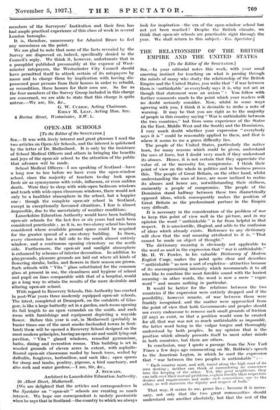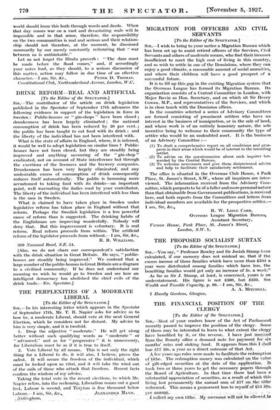THE RELATIONSHIP OF THE BRITISH EMPIRE AND THE UNITED STATES
[To the Editor of the SPECTATOR.]
SIR,—In your editorial notes this week, with your usual unerring instinct for touching on what is passing through the minds of many who study the relationship of the British Empire and the United States, you write that " if war between them is unthinkable' as everybody says it is, why not act as though that statement were an axiom " ? You follow with further comments much to the point which your readers will no doubt seriously consider. Now, whilst in some ways agreeing with you, I think it is desirable to strike a note of warning. It may be that you are right as to the majority of people in this country saying " War is unthinkable between the two countries," but from some experience of the States (in the East, Middle West and the South) and the Dominions, I very much doubt whether your expression " everybody says it is " could be reasonably applied to them, and that is where it seems to me a grave difficulty lies.
The people of the United States, particularly the native born, for many reasons which could be given, understand the uses of force, but I doubt very much if they understand its abuses. Hence, it is not certain that they appreciate the value of, or the necessity for, compromise. I think their point of view on the whole in politics and in business proves this. The people of Great Britain, on the other hand, whilst understanding the uses of force, are more inclined to realize its abuses and hence are, notwithstanding their stiffness, eminently a people of compromise. The people of the Dominion stand halfway between these two diametrically opposed ideas, which consequently makes the position of Great Britain as the predominant partner in the Empire very difficult.
It is necessary in the consideration of the problem of war to keep this point of view well in the picture, and in my opinion the word " unthinkable " is far from helpful in that respect. It is unscientific, illogical, and adds to the confusion of ideas which already exists. Reference to any dictionary will show that the real meaning attributed to it is, " That cannot be made an object of thought."
The dictionary meaning is obviously not applicable to
the word as used in the expression that " war is unthinkable." Mr. H. W. Fowler, in his valuable Dictionary of Modern English Usage, makes the point quite clear and describes " unthinkable " as now a sort of expletive—attractive because of its uncompromising intensity which recommends it to all who like to combine the most forcible sound with the haziest meaning—in other words, the word is now a mere " vogue word " and means nothing in particular.
It would be better for the relations between the two countries if the expression were entirely dropped and if the possibility, however remote, of war between them were frankly recognized, and the matter were approached from
the point of view that both Governments and peoples should use every endeavour to remove such small grounds of friction (if any) as exist, so that a position would soon be created for all, that war was not so much unthinkable as impossible, the latter word being in the vulgar tongue and thoroughly understood by both peoples. In my opinion that is the position which already presents itself to most sober minds in both countries, but there are others.
In conclusion, may I quote a passage from the New York Times a few days ago commenting on Mr. Baldwin's speech to the American Legion, in which he used the expression that " war between the two peoples is unthinkable " :- " Each country must, and will, travel along the high road of its own destiny ; neither can think of surrendering its conscience into the keeping of the other. Yet, like good neighbours, they can talk over their mutual problems, explain frankly their respective desires and requirements and make such concessions, one to the other, as will maintain the dignity and respect of both.
That way, it seems to me, peace lies ; because it is neces- sary, not only that the two great communities should understand one another absolutely, but that the rest of the world should know this both through words and deeds. When that day comes war on a vast and devastating. scale will be impossible and in that sense, therefore, the responsibility on the two communities is real and .serious and their.relation- ship should not therefore, at the moment, be dismissed summarily by our merely . constantly reiterating that-` war between us is unthinkable."
Let us not forget the Hindu proverb : " The darn must be made before the flood comes," and, if accordingly your notes lead, as they should, to. a serious discussion of this matter, action may follow in due. time of an effective



















































 Previous page
Previous page